Quotes & Sayings About Distorted Body Image
Enjoy reading and share 4 famous quotes about Distorted Body Image with everyone.
Top Distorted Body Image Quotes

American Psychological Association, the girlie-girl culture's emphasis on beauty and play-sexiness can increase girls' vulnerability to the pitfalls that most concern parents: depression, eating disorders, distorted body image, risky sexual behavior. — Peggy Orenstein

God reproduces and lives out His image in millions of ordinary people like us. It is a supreme mystery. We are called to bear that image as a Body because any one of us taken individually would present an incomplete image, one partly false and always distorted, like a single glass chip hacked from a mirror. But collectively, in all our diversity, we can come together as a community of believers to restore the image of God in the world. (In His Image, Philip Yancey and Dr. Paul Brand, p. 40) — Philip Yancey

The problem is that much of what we have learned is harmful to our system because it was learned in childhood, when immediate dependence on others distorted our real needs. Long-standing habitual action feels right. Training a body to be perfect in all the possible forms and configurations of its members changes not only the strength and flexibility of the skeleton and muscles, but makes a profound and beneficial change in the self-image and quality of the direction of the self. — Moshe Feldenkrais

Eating disorders are prevalent among women who were sexually abused as children. They seem to have components of other symptoms such as obsessions, compulsions, avoidance of food, and anxiety, and they primarily include a distorted body image and feelings of body shame.
For some women, eating disorders are related to the loss of control over their bodies during the sexual abuse and serve as a means of feeling in control of their bodies now. Eating disorders can also be indicative of the developmental stage and age at which the sexual abuse began. Women with anorexia and bulimia report that they were sexually abused either at the age of puberty or during puberty, when their bodies were beginning to develop and they felt a great deal of body shame from the abuse. By contrast, women with compulsive eating report that the sexual abuse occurred before the age of puberty; they used food for comfort. — Karen A. Duncan





